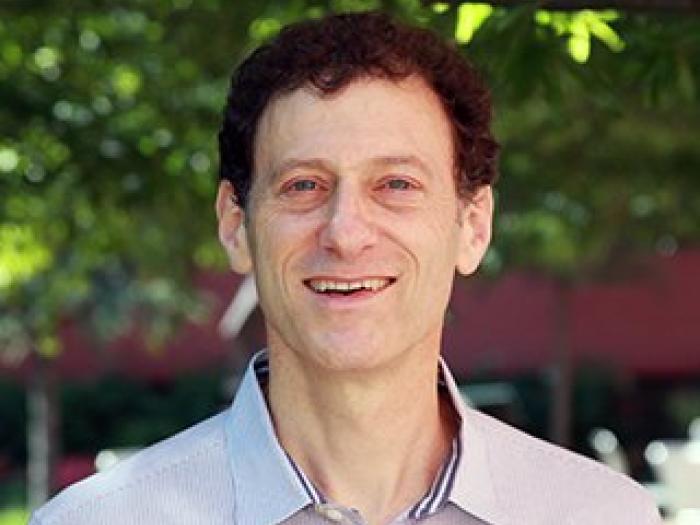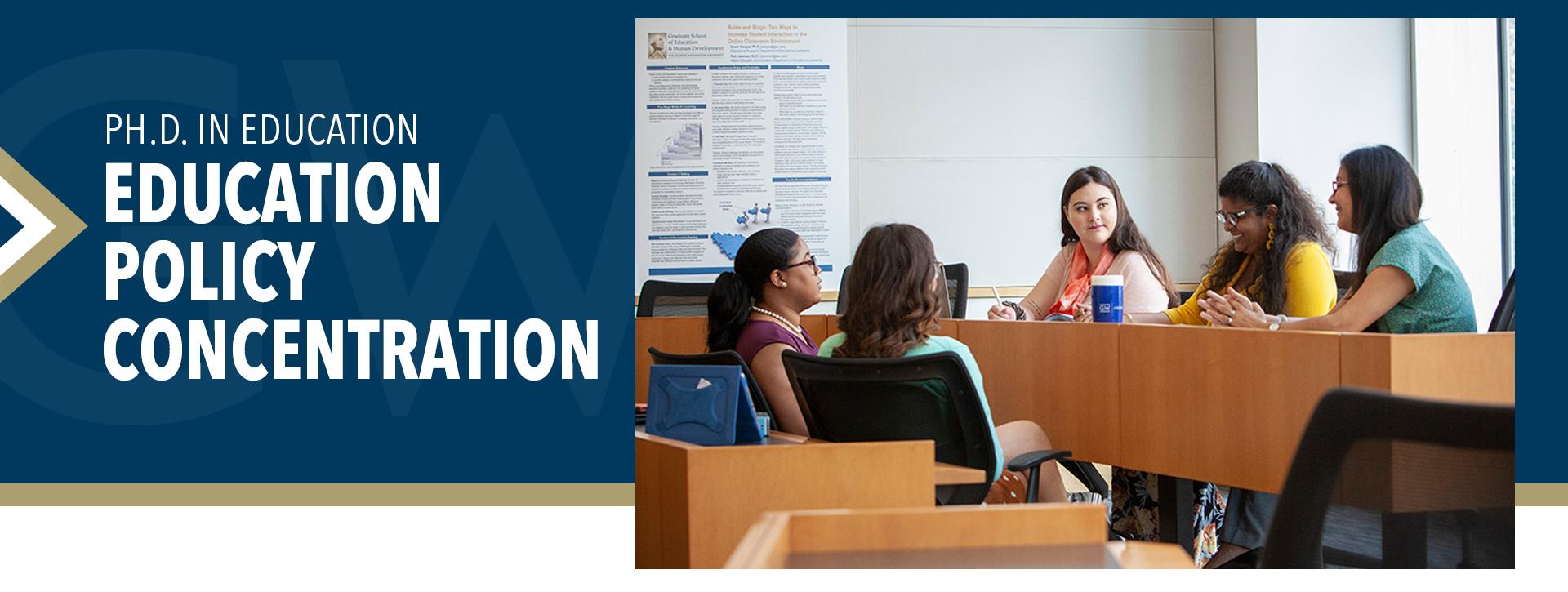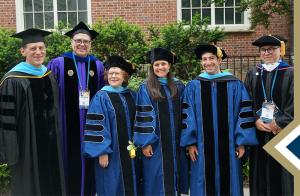Ph.D. in Education - Education Policy Concentration
Set the Standard for Education Reform
Contemporary education systems face an extraordinary range of complex problems that pose daunting challenges for policymakers and researchers. Closing the achievement gap, increasing access to college for marginalized communities, examining the equity consequences of education reform, and improving the quality of instruction are some of the most critical issues our faculty, students, and alumni work to solve.
The Ph.D. in Education's Education Policy Concentration is designed to foster the methodological skills and conceptual understanding needed to systematically address complex and multi-faceted education issues. Students develop expertise in examining and assessing education problems and their interaction with their broader social environments.
Learn more about the role of education policy experts in shaping the future of education >
A Cross-Disciplinary Education
The program relies on interdisciplinary paradigms and methodological tools (including public policy, economics, sociology, political science, and psychology) to train students in evidence-based problem-solving research that informs policy and practice.
Leading Faculty
Learn from nationally recognized researchers and practitioners with extensive experience leading professional organizations and research in education policy.
Small + Diverse
Our students come together from around the world, bringing a wide range of professional experience and viewpoints that result in dynamic dialogue. The small class size ensures individualized learning and mentorship from faculty, as well as substantive engagement.
Accommodating
Classes are scheduled once a week in the evening (Monday-Thursday) to accommodate the schedules of those who work and hold internships.
Our Location is Your Advantage
Uniquely situated in the heart of Washington, D.C.—with proximity and connections to several think tanks, federal agencies, and professional associations—students are exposed to a rich environment to advance and hone their research skills in the field. Benefit by examining education reform in the policymaking capital of the world.
As a Carnegie R1 institution, the George Washington University is home to world-class faculty that are leading cutting-edge research, along with diverse labs, cross-collaborative initiatives with GW programs, schools, and local organizations, and unparalleled educational and employment opportunities.
Degree:
Doctor of Philosophy (PhD) in Education, Education Policy Concentration
Course Delivery:
Foggy Bottom Campus
Program Entry:
Fall
- Our Mission
The aims of the PhD program are to:
- Use multiple modes of scholarly inquiry to conduct rigorous research and develop new theory related to problems that require the integration of multiple disciplines and fields of study, in which education and/or human development play a major role.
- Build theoretical and conceptual foundations of key fields of study within the larger domain of education and human development.
- Contribute to the improvement of policy and practice.
- Promote research in partnership with other organizations (e.g., think tanks, research institutes, both in the U.S. and abroad).
- Create a highly valued educational experience at GSEHD through innovation, increased collaboration, and research.
- Curriculum Requirements
The following requirements must be fulfilled: 60 credits, including 36 credits in core courses, and 24 credits in the concentration, successful completion of a research project, successful completion of the comprehensive examination; oral defense of both the dissertation proposal and the dissertation.
During the first year of coursework all students complete a program evaluation course in which they conduct an evaluation project and formally present their findings. In their second year, students design and execute course-based analytical papers that follow a dissertation research design. In the third year, students complete a project which are is tied to the Advanced Proseminar where students present and execute a complex research design that addresses a policy problem. Once students successfully pass the comprehensive examination, they move into completing their dissertations.
Required Core Courses: SEHD 8200 Foundations of Education I SEHD 8201 Foundations of Education II SEHD 8210 Doctor of Philosophy Seminar in Education Research I SEHD 8211 Doctor of Philosophy Seminar in Education Research II Research Methods: 12 credits of doctoral-level research methods coursework, selected in consultation with advisor. At least one course must be in quantitative research methods and one in qualitative research methods. Dissertation: SEHD 8999 Dissertation Research (taken for at least 12 credits) Additional Requirements: Successful completion of a research project. Successful completion of the comprehensive examination. Oral defense of both the dissertation proposal and the dissertation. Education Policy Concentration Requirements: EDUC 8321 Economics of Education EDUC 8322 Education Policy Implementation 18 additional credits in graduate-level courses determined in consultation with the advisor. Course selections are determined by the focus of the concentration and the specific interests of the student. - Program Outcomes
-
- Through a flexible interdisciplinary curriculum and rich research environment, students develop skills and conceptual understandings needed to systematically address complex and multi-faceted education problems.
- Students gain expertise in examining and assessing educational issues and their interaction with their broader social environments.
- Students are exposed to multiple perspectives on various contemporary education problems such as urban schooling reform, student achievement, education funding and its equity implications, teacher quality and effectiveness, inequality and equal opportunity, access to higher education, and accountability in educational systems.
- Students expand on their research skills through continual engagement with faculty and researchers in teams of active projects with hands-on research training and expectation to produce publishable research products.
Apply Now
GSEHD’s Office of Admissions invites you to apply for a spot in our program. Please review the following admission and financial information.
Ready to take the next step in your career? Review our step-by-step guide to applying to GSEHD >
To learn more about the program, admission process, and upcoming events, please connect with the GSEHD Admissions Team at docinfo![]() gwu [dot] edu (docinfo[at]gwu[dot]edu) or 202-994-9283.
gwu [dot] edu (docinfo[at]gwu[dot]edu) or 202-994-9283.
| Apply Now | Schedule Meeting with Admissions Coach |
To be considered for admission, applicants must submit the online application form as well as the following required supporting documents. There is no application fee.
- Prerequisite: Master’s degree in a field relevant to the program
- Curriculum Vitae
- Statement of Purpose: An essay of less than 1200 words, in which the candidate states his/her purpose in undertaking cross-disciplinary graduate study including: (a) rationale for seeking a Ph.D. in Education Policy and any particular focus; (b) articulation of personal research interests; and (c) how his/her background and related qualifications have prepared him/her for this work and will align with long term goals.
- 3 Letters of Recommendation: At least two must be from a professor or advisor in the applicant’s prior Master’s degree program. Recommenders should indicate the applicant’s academic ability and potential for pursuing a Ph.D. degree.
- Writing Sample: Candidates shall submit a current writing sample that demonstrates their analytical skills. The sample should reflect the candidate’s ability to frame and conduct analysis. The sample should also provide an example of the candidate’s research skills, as well as her/his engagement with scholarship in pursuing his/her research interests. An already published work, a master's thesis, or an academic research paper would be sufficient.
- Transcripts: From all previously attended colleges or universities
- Interview with Faculty: Applicants who meet the program’s qualifications will be interviewed. A candidate is expected to give a presentation on her/his specific interests and aspiration to pursue the degree. Applicants are expected to demonstrate a solid ability to clearly articulate how her/his skills and prior training/experiences prepare her/him to undertake a Ph.D. study.
- Additional information may be requested to assist in application review.
Please note: The GRE is not required.
*Additional application requirements may exist for international applicants.
Applications are being accepted for Fall 2026. We encourage you to apply as early as possible.
| Application Timeline | Fall |
|---|---|
| Priority Deadline | Nov 1 |
| Round 1 Deadline | Dec 1 |
| Round 2 Deadline | Jan 15 |
For more information or to inquire about the next admissions cycle, contact the GSEHD Admissions Team at docinfo![]() gwu [dot] edu (docinfo[at]gwu[dot]edu) or 202-994-9283.
gwu [dot] edu (docinfo[at]gwu[dot]edu) or 202-994-9283.
Tuition & Financial Aid
We know embarking upon graduate school is a big decision - due in part to the costs of attending. At GW, we understand the time and thought behind making graduate school work for you. Please take a moment to learn more about the options and opportunities available to help fund your graduate education.
Graduate tuition is charged per credit hour, unless otherwise noted. Rates vary by program and location.
The tuition rate* for the PhD in Education - Education Policy Concentration program is $1,960 per credit hour.
This program requires 60 credits.
Please note: Additional fees may apply for international students, late fees, etc. Current tuition rates may be updated during the year.
*Summer 2025, Fall 2025 and Spring 2026
Scholarships are available to eligible admitted students. Review eligibility requirements and learn more about funding your education >
The doctorate program at GSEHD enabled me to dive deep in my focus on school system improvement and its connecting on outcomes of our most vulnerable students. The knowledge gained was critical to my personal and professional growth.
SCOTT JOFTUS (PhD '02)
PhD in Education, Education Policy and Leadership
Founder and President, FourPoint Education Partners
Career Outlook
Graduates assume positions in think tanks, academic institutions, non-profit national organizations, government agencies, and international organizations.
- Education Policy Career Opportunities
-
Graduates have assumed the following positions:
- Senior Policy Analyst, Congressional Research Service
- Senior Associate for Education, Annie E. Casey Foundation
- President and Co-Founder, Four Points Education Partners (research-consult group)
- Senior Study Director, Westat
- Senior Researcher and Policy Analyst, National Education Association
- Senior Researcher, American Institutes for Research
- Director, Core Knowledge Foundation
- Assistant Professor and Director, EAP program, GW
- Assistant Professor, University of Delaware
- Assistant Professor, Meiji University, Tokyo, Japan
- Associate Professor, Lahore School of Economics-Pakistan
- Associate Professor, Sun Yet Sen University-China
- Associate Professor, University of Kragujevac, Serbia
- Evaluation and Assessment Director, Alexandria City Public Schools
- Associate Partner for Policy and Evaluation, Bellwether Education Partners
- Chief Technical Advisor, USAID Nepal
- Vice President of Strategy, Complete College America, Washington, DC
Alumni have also received positions for the following organizations:
- Aspen Institute
- DC State Board of Education
- Institute for Public Research-CNA
- Inter-American Development Bank
- Massachusetts Dept of Education
- National Board Prof Teaching Standards
- National Governors Association
- Save the Children
- The Urban Institute
- U.S. Department of Education, U.S. Department of Labor, and U.S. Congress
- World Bank




Additional Faculty
The interdisciplinary design of the program provides students with rich opportunities to work and collaborate with several faculty in various GW departments and Institutes (such as the Trachtenberg School of Public Policy & Administration), as well as researchers in various think tanks in the greater DC area.







